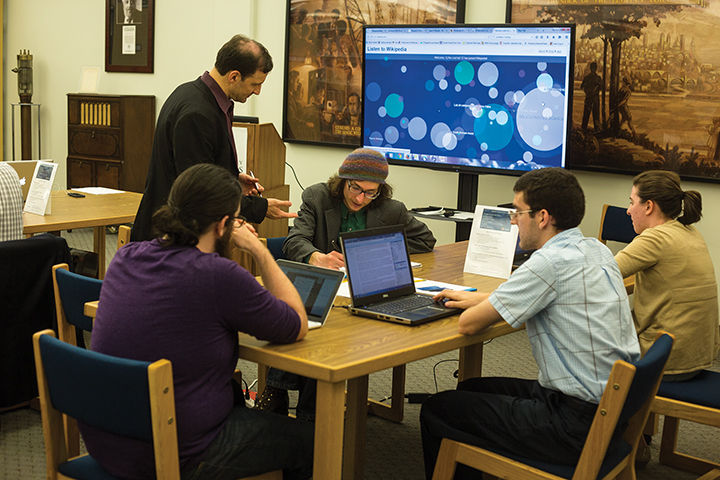
People gathered in Hornbake Library on Friday May 1, 2015 to edit Wikipedia articles related to the Labor Party.
The faux pas of citing Wikipedia as a source may soon become archaic.
Through edit-a-thons, Wikipedia, the free online encyclopedia users can edit, is teaming up with institutional archives to improve its information. The university held one Friday during International Workers’ Day at Hornbake Library. The event brought together volunteers, students and faculty from the history department and University Libraries as well as representatives from Wikimedia to update and create new articles about labor history.
Helping kick off D.C. LaborFest, the edit-a-thon focused on revising and adding accurate information about workers’ rights, labor movements and unions using copies of Labor’s Heritage journal and the university’s American Federation of Labor and Congress of Industrial Organizations archives.
“It’s a way of creating articles that didn’t exist before and building awareness of our labor collection,” said Jennifer Eidson, the university’s labor collections archivist.
The university joined a nationwide effort with other labor archives, including Cornell University, in the edit-a-thon. Chris Garlock, the director of D.C. LaborFest, noted how the event resonates with what is going on today in the labor movement.
“What we’re doing now is connected to what was going on 50 to 100 years ago,” he said, adding that the section on labor history in the Metropolitan Washington Council AFL-CIO newsletter, UNION CITY!, consistently ranks highest among readers.
Eidson said the turnout of about a dozen attendants was way beyond her expectations, and many pleaded to stay and edit rather than take a tour of the archive. James Hare, the president of Wikimedia D.C, said the edit-a-thon’s low-commitment nature helped contribute to the casual yet productive atmosphere.
The event began with basic training and instructions on how to navigate Wikipedia and contribute valuable content to the site. As the participants revised and added to pages, they chatted comfortably and revealed interesting discoveries. Editors would use their print resources to work on a page, such as the Fulton Bag and Cotton Mills entry about the site of labor strikes in Atlanta more than a century ago, adding links and citations to each entry.
This all came as part of Wikipedia’s goal to become a starting point for research. The information might not be comparable to the Encyclopedia Britannica, but more of a compilation of reliable sources.
“The library and archives community is changings its point of view [on Wikipedia],” said Eidson.
The edit-a-thon also promoted this university’s collection of archives, so the event was mutually beneficial. Wikipedia is working to improve relationships through the GLAM-Wiki initiative, which collaborates institutional resources from galleries, libraries archives and museums with experienced Wikipedia editors. As a result, the accuracy and amount information on Wikipedia pages is improved while institutions advance exposure to their historical archives.
Both Garlock and Eidson expressed wanting to hold another edit-a-thon in the future. Garlock said the universality of Wikipedia makes edit-a-thons a successful tool to promote labor history.
“Everybody uses [Wikipedia],” he said. “And [the edit-a-thon] turns passive consumers into active participants.”
The continuing collaboration between Wikipedia and institutional archives will improve the content of the online encyclopedia while bringing attention to important historical collections. Through edit-a-thons, print resources and historical artifacts can still be preserved and revered.
“[The edit-a-thon] fills in gaps that weren’t filled in before,” said Hare.



